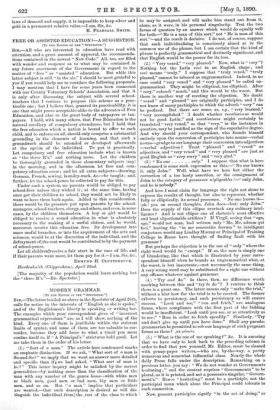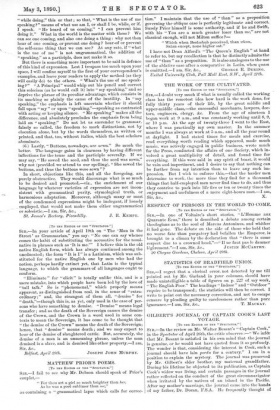MODERN GRAMMAR.
[To THE EDITOR OF THE " SPECTATOR.") SIR,—The letter headed as above in the Spectator of April 26th, calls for notice in the interests of "English as she is spoke," and of the Englishman's liberty in speaking or writing her. The examples which your correspondent gives of " incorrect grammatical expressions " are, as I will show, nothing of the kind. Every one of them is justifiable within the strictest limits of syntax, and some of them are too valuable to sur- render, because they add force to what a timid pen must confine itself to, if " A•Principars " strictures hold good. Let me take them in the order of his letter.
(1.) " Sort of a man." The article here condemned marks an emphatic distinction. If we ask, " What sort of a man is So-and-So P " we imply that we want an answer more detailed and specific than ifj we had asked, " What sort of man is be ?" This latter inquiry might be satisfied by the merest generalities—by nothing more than the classification of the man with any number of the genus home—with white men or black men, good men or bad men, big men or little men, and so on. But " a man " implies that particulars are wanted,—that such description is desired as will dis- tinguish the individual_ from the rest of the class to which
he may be assigned, and will make him stand out from it, alone, as it were, in his personal singularity. Test the two forms of question by an answer which would do equally well for both—" He is a man of this sort," not " He is man of this sort "—and the result is decisive. I do not, of course, suppose that such individualising is consciously aimed at in the common use of the phrase, but I am certain that the kind of phrase is perfectly grammatical and distinctly significant, and that English would be the poorer for its loss.
(2.) " Very vexed," " very pleased." Now, what is " very "?. Nothing but the Latin veré in an English shape ; and verg means " truly." I suppose that " truly vexed," " truly pleased," cannot be tabooed as ungrammatical. Indeed, in no case could "very vexed" and "very pleased" be called un- grammatical. They might be elliptical, too elliptical. After "very," subaudi "much," and this would be the worst. But there is another way of meeting the objection. No doubt " vexed" and " pleased" are originally participles, and I do not know of many participles to which the adverb " very " can be prefixed. But there are some, as, e.g., "very learned," "very accomplished." I doubt whether vexatissimus would not be good Latin," and vexatissimus might certainly be translated " very vexed," so that " very," in the instances in question, may be justified as the sign of the superlative degree. And why should your correspondent, who founds himself entirely upon the conversion of participles into nouns—verbal nouns—grudge to our language their conversion into adjectives —verbal adjectives ? Treat " pleased" and "vexed" as adjectives, and " very vexed" and " very pleased" are just as good English as " very sorry " and " very glad."
(3.) " No one only." I suppose that what is here condemned is some such expression as this,—" No one knows it, only John." Well, what have we here but either the correction of a too hasty assertion, or the consignment of John to the category of personnel negligeables /—" only John, and he is nobody."
And here I must claim for language the right not alone to express the results of thought, but also to represent, whether fully or elliptically, its actual processes. " No one knows it— (oh ! yes, on second thoughts, John does—but) only John." Does the supply of this ellipse overtask any ordinary intel- ligence P And is not ellipse one of rhetoric's most effective and least objectionable artifices P If Virgil, seeing that "ego, ego," would not scan, had written only " Me, Me, adsum qui feci," leaving the " in me convertite ferrum " to intelligent conjecture, would any Lindley Murray or Principal of Training College in Rome have thought of finding fault with his grammar ?
But perhaps the objection is to the use of " only " where the right word would be " except." If so, the case is simply one of blundering, like that which is illustrated by your corre- spondent himself when he brands as ungrammatical what, at the worst, is but inaccurate,—not necessarily the same thing. A very wrong word may be substituted for a right one without any offence whatever against grammar.
(4.) " Try and do." Is there, then, no difference worth marking between this and "try to do "? I venture to think there is a great one. The latter means only "make the trial," without a hint how far the trial is to be carried. The former exhorts to persistency, and such persistency as will ensure success. " Look and see," " run and fetch," are analogous forms, where compliance with the first part of the bidding would be insufficient. " Look until you see, or so attentively as to see ;" " Run in order to fetch speedily." Similarly, " Try and don't give up until you have done." Shall any pseudo- grammarian be permitted to rob our language of such pregnant forms as these ? f.zoi y6orro.
(5.) " What is the use of me speaking ?" &c. It is amusing that we have only to look back to the preceding column in order to find that you yourself, Mr. Editor, must be classed with penny-paper writers,—who are, by-the-way, a pretty numerous and somewhat influential class. Nearly the whole daily Press falls under the description. Remarking on a previous letter, you say : " We do not wonder at Governments hesitating ; " and the context requires " Governments " to be plural, as it is printed, and not a possessive singular, " Govern- ment's." Hence "hesitating?" must be a participle, not the participial noun which alone the Principal could tolerate in such connection.
Now, present participles signify "in the act of doing," or
" while doing," this or that ; so that, " What is the use of me speaking P" means of what use am I, or shall I be, while, or if, I speak. " He heard of us coming," " I can prevent him doing it." What in the world is the matter with these ? We can see one coming, and also one doing a thing : why not then hear of one coming, or prevent one doing ? hear-of or prevent the self-same thing that we can see ? At any rate, if " what is the use of me " is not ungrammatical, the addition of "speaking," as a participle, does not make it so.
But there is something more important to be said in defence of this kind of expression. Lest I trespass too much upon your space, I will confine myself to the first of your correspondent's examples, and leave your readers to apply the method (as they will easily do) to the others. " What's the use of me speak- ing P" "A Principal " would whip out his pencil and correct this solecism (as he would call it) into " ray speaking," and so deprive the phrase of its peculiar advantage, which consists in its marking so plainly the cause of the inutility. In " my speaking," the emphasis is left uncertain whether it should fall upon "my" or upon "speaking,"—speaking as contrasted with acting or keeping silence. "Me speaking" makes all the difference, and absolutely precludes the emphasis from being laid on " speaking." Do not let us surrender to grammar, falsely so called, the freedom to mark distinctions, not by elocution alone, but by the words themselves, as written or printed, and that, too, without italics, which the best scholars abominate.
(6.) Lastly, " Buttons, nowadays, are sewn." So much the better. The language gains in clearness by having different inflections for the tense and the participle severally. If we may say, " He sowed the seed, and thus the seed was sown," why not (provided we attend to our spelling), " She sewed the buttons, and thus the buttons were sewn" ?
In short, objections like this, and all the foregoing, are purely obstructive. They would discourage what is so much to be desired and promoted,—viz., the enrichment of our language by whatever varieties of expression are not incon- sistent with grammatical purity, etymological truth, or harmonious adaptation. Moreover, although many or most of the condemned expressions might be inelegant, if loosely employed, that would not make them either ungrammatical or solecistic.—I am, Sir, &c.,
St. James's Rectory, Piccadilly. J. E. KEMPE.







































 Previous page
Previous page